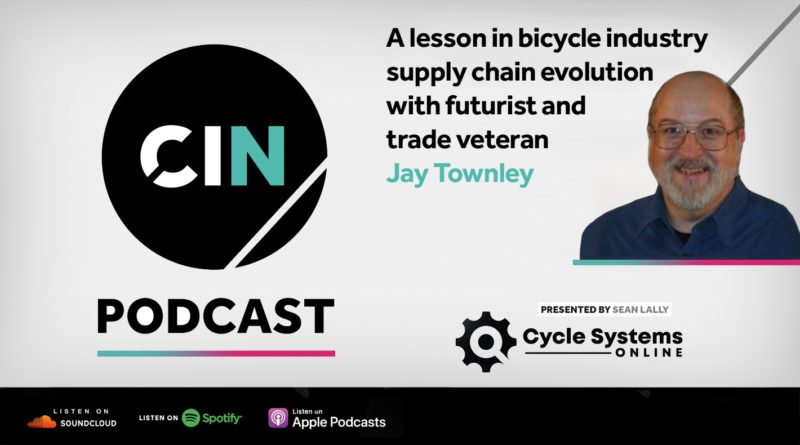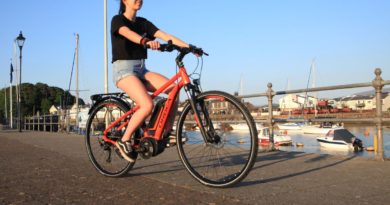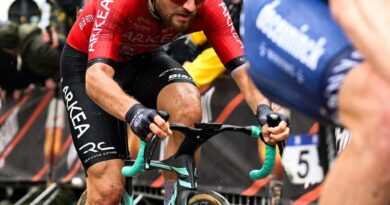CI.N Podcast: Jay Townley speaks on supply chain adjustment and future risks
We’re thrilled to welcome back to the CyclingIndustry.News Podcast the bike industry’s human equivalent of Wikipedia and long-term market researcher Jay Townley, who takes on the subject of the supply chain, plus the idea of manufacturing closer to home.
A more than 60-year veteran of the cycling industry who started in the bike shop and eventually became the president of Giant Bicycles in the U.S., nowadays Jay is best known market researcher with Human Powered Solutions, which alongside Sports Marketing Surveys fuels the National Bicycle Dealers Association’s USA market reports. For those invested in the bike industry, we highly recommend signing up to Jay’s Micromobility Reporter emails.
Our most in-depth podcast for some time at double the usual run time, this episode is spent exploring the past, present and future of bike industry supply chain functionality; how Black Swan events like war and the pandemic have changed things forever; the difficulty in realising profitability on bike sales; entering a recession; plus how overstock of inventory can become a business’s greatest burden, in particular as the consumer tightens spending.
“The bike industry, bike shops, brands and associations have to stop this mantra of ‘when it returns to normal’, there simple is no normal to go back to, there is only the future. We live in an era of constant disruption,” says Jay, pointing to Covid’s resurgence, climate change and other factors likely to remain in play for businesses to plan around.
With associated supply chain and shipping disruptions still in play, Jay assesses fresh risks, including conflict in the Taiwan Strait where China is currently conducting live fire military drills in a show of force. Given that the U.S. bicycle industry is an importer of over 95% of its bicycle goods, could home manufacturing be part of a long-term solution to overcoming supply chain turbulence? That’s addressed in detail.
“I am a supporter of reshoring, I think that makes economic sense, but – and it’s a big but – we do not have in the United States the support industry. We have gone three decades of no bicycle manufacturing here, we have no component industry,” says Jay, revealing that he has been to the White House to encourage investment and support for the industry.
“The Government of the United States needs to support the tax breaks and incentives to bring the component manufacturers from China and Taiwan to set this cluster of component manufacturers up to support the bicycle corporations of America. It makes economic sense to reshore a portion of your production and supply chain. It makes more sense now than it did then. By the way, the Government didn’t do anything, we asked the Secretary to eliminate tariffs on componentry and they went the other direction and, on top of the 10% average for components, they slapped 25% punitives on. And in addition to the 5.5% and 11% for bicycles, they slapped 25% on and for eBikes there was no tariff and they slapped 25% on. The excuse at the time was this idiotic notion that the Chinese will pay for it. They don’t, the American consumer pays for it, the importer pays that punitive tariff and so the retailer and customer pays for it.”
Now conflict again appears to be brewing in one of the world’s busiest shipping lanes, what risks lie ahead for countries so reliant on imports?
“China, in our view, is going to be a high risk place to do business for the American company, perhaps more so than for the Europeans. Our president spoke to Xi Jinping yesterday and their major concern is the dispute with Taiwan. Unfortunately, it turns out is that if we have a problem with China in bike manufacturing the first place we go is Taiwan. 80% to 85% of the Chinese bicycle business is owned by the Taiwanese. So consequently for the bike industry they are bound to each other. The Chinese bicycle business for export learned from the Taiwanese.
“The conundrum we have in the United States is dependent upon how we develop the expertise. Consider this – Trek and Specialized have excellent engineering departments, so they could tell you what kind of electric bike they want and could design it, but quite frankly, they don’t know how to make it. If an American company wants to retool a whole new product it’s got to get on a Zoom call and connect with the engineers overseas to do the manufacturing and engineering.”
Tune in below, or for prior episodes with industry thought leaders head here. If you prefer to listen on Spotify, see our channel here. Finally, if you use Apple’s podcast player, head here.
To get a handle on UK specific market trends, as also discussed in this podcast, you can purchase CyclingIndustry.News annual market research by emailing us here.
With thanks to our host, Sean Lally at Cycle Systems Online.



